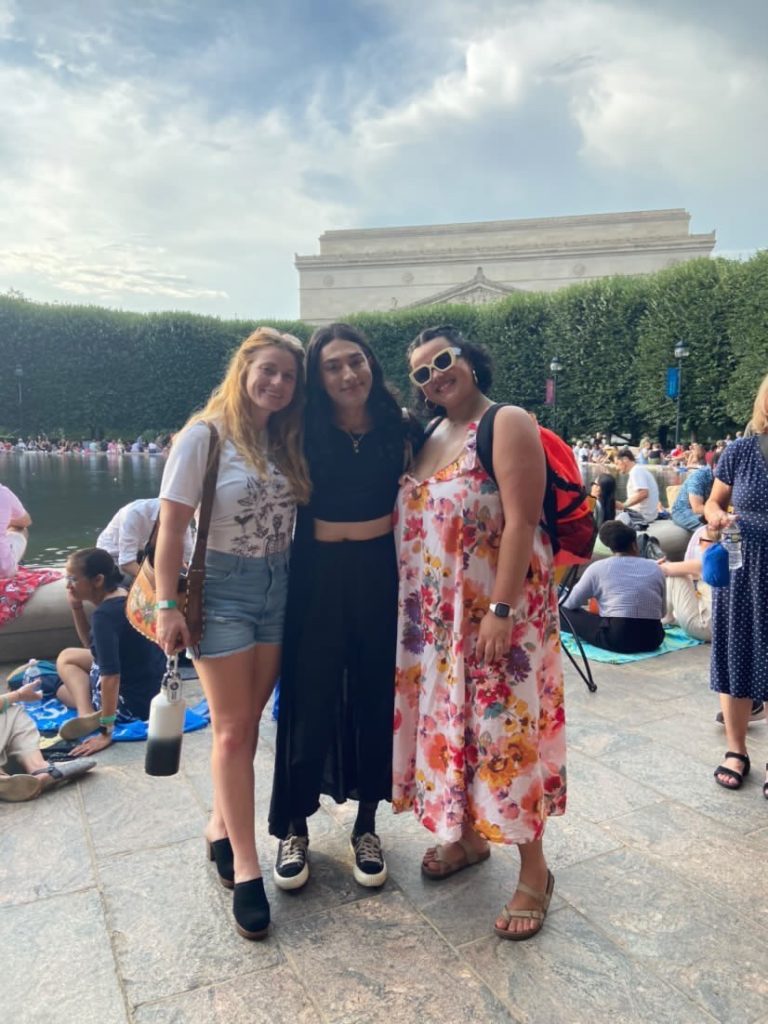By: Nicolas Chehade
The realization that the US economy has such deep and purposefully overlooked roots in the caregiving workforce, relying heavily on the labor of BIPOC and migrant communities, is an important one. With this issue in mind, our team of four Integration Lab (i-Lab) students embarked on our global partner experience with Oxfam America: to assess federal-level policies regarding human resources in the workforce and the transformative impact of these policies on the unpaid and underpaid workers in the care sector in the US.
As MGA students, our first year of academic training at the Keough School prepared us to take on this challenge, helping us examine the overlap between human rights and the workforce. First, our Macroeconomics course helped us understand the economic drivers, challenges and tools that governments use to stoke the growth of their economies. The underlying factor of such growth, and one of the main resources needed for increased production, is human labor, a source of finite supply which is supported behind the scenes by essential care workers.
In addition, discussions in our International Human Rights course helped us connect the dots between the practical aspects of human rights, the day-to-day functions of those rights, and the different tools used to uphold or abuse them, the guarantor of those rights, and the multilateral cooperation needed to create an environment that enables human rights. Further, research methodology courses such as Policy Evaluation helped us tackle the problem in a pragmatic, evidence-based approach. We learned to identify validity issues and implement robustness checks to ensure we accurately capture whatever we intend to measure.
The opportunity to bridge our academic learning and environment with our partner’s practical approach has provided us with so many enriching discussions: we consulted with esteemed researchers in the Keough School on methodological approaches, challenges and potential solutions, and strategies for proper and accurate data collection. We also participated in discussions with prominent organizations, professionals, and partners of Oxfam America to discuss project implementation and strategies to mitigate potential problems in data collection and expert interviews. We are seeing the fruit of an academic-practice collaboration: informed programmatic implementation; applying theoretical frameworks to real-life issues.
The completed reports from this project will shed light on the underlying (and mostly unresolved) challenges that US care workers face, from a shortage of budgetary allocations to certain federal programs and policies like social security, health care and adequate pay, to the inaccessibility of such programs and policies by different demographic groups, the most underrepresented groups being BIPOC and migrant communities. Our eight-week field implementation and two weeks of remote work will yield a final report detailing the effect of major US federal policies on the unpaid and underpaid care sector, as well as highlighting some states’ brilliant implementation of impressive care-related policies. The report will also include an analysis based on the interviews regarding challenges in implementing policies, in universal accessibility, and in the disparity of access for the most underrepresented.
One preliminary finding I want to share from our fieldwork and research is that a shift in perception of care work is needed: what was once taken for granted as a low-skilled job of care needs to be seen as a highly-skilled job requiring experienced and knowledgeable care workers. A shift in perception, and therefore in biases towards care work, would have positive implications for the well-being of those who have been historically ostracized and undervalued. Hopefully, our report will also serve as an advocacy tool for human rights advocates and organizations such as Oxfam to continue their fight for care workers’ rights, for the most underrepresented of communities to have a voice and have the recognition they need.
Going into this project, I expected that it would be fairly straightforward. First we go to Washington, DC; we review legislation and score them; then we do interviews. The first week out quickly changed that initial idea like a slap in the face. The scorecard took much longer than expected, as it required reading through hundreds of pages of legislation to even begin to develop a scoring tool. Our palpable excitement at the start was clouded by this stark reality, and we had to dramatically adjust our expectations. To deal with the time constraints and still complete our project, we needed to adapt. We met with partners, with experts, and with researchers, and we adapted. One of the main lessons that I took away from this experience is that a project never ceases to evolve, adapt, change; it is a living, breathing mechanism that requires constant and vigilant attention from those implementing it.

I remember that the first week of orientation in the MGA program, we were told that these human connections and experiences we would have in our field work are what will be engraved in us, not only our academic development—and they were right. As much we strove to deliver a quality outcome for our project, the journey in itself holds as much importance to me. The day-to-day life, navigating a new city, living with colleagues, exploring the area, tasting the food, making new friends and connections, roaming around and taking in all this newness that comes with adventure–this is what we take with us personally. I expected to have a valuable experience to further my professional development, and I did. I am proud of the work that we accomplished on this project. But a year from now, or a decade from now, I will treasure most the lived human experiences and connections I gained from this i-Lab field project.
Top photo: Fireworks on the 4th of July, as seen from the National Mall, behind the Washington Monument.

